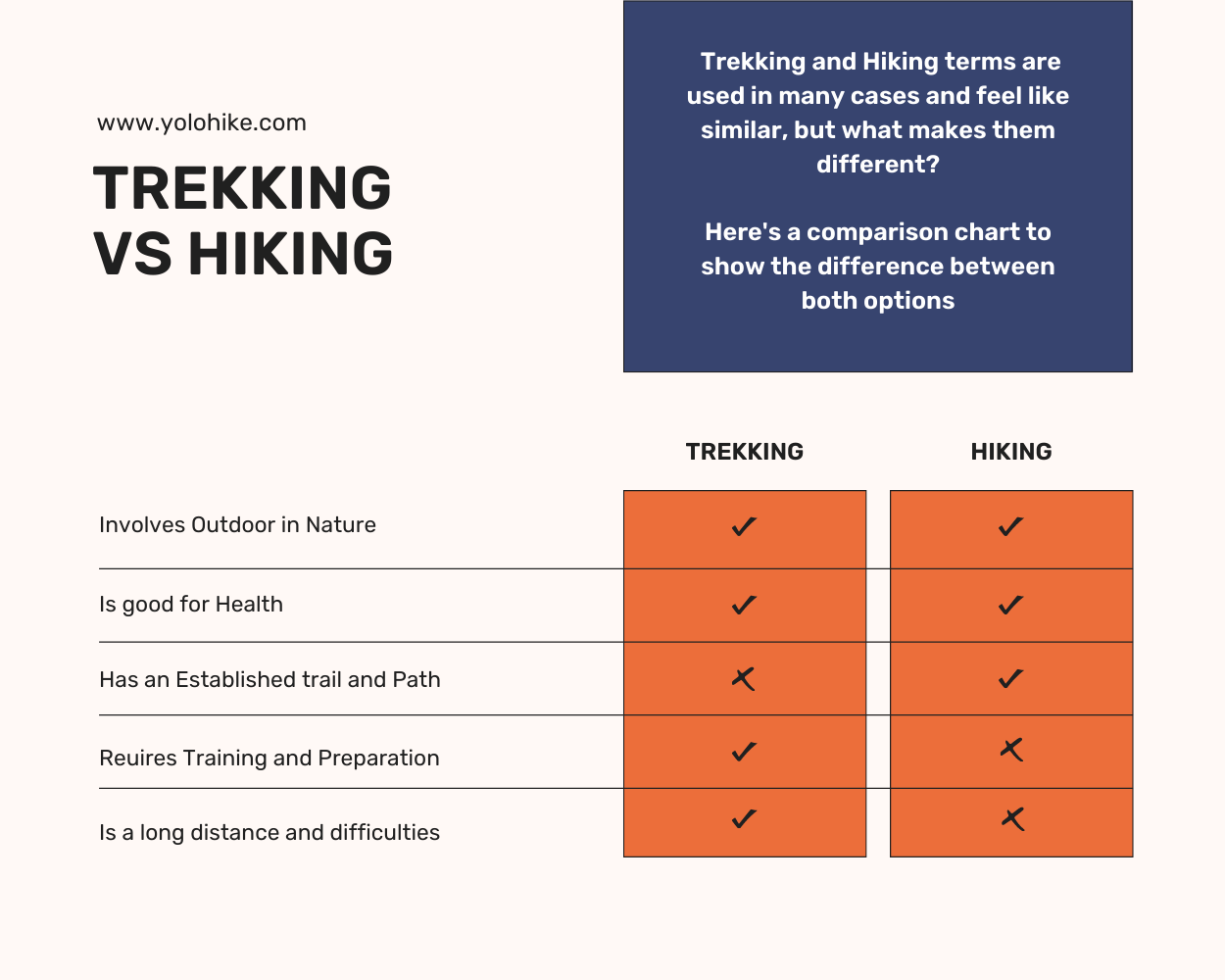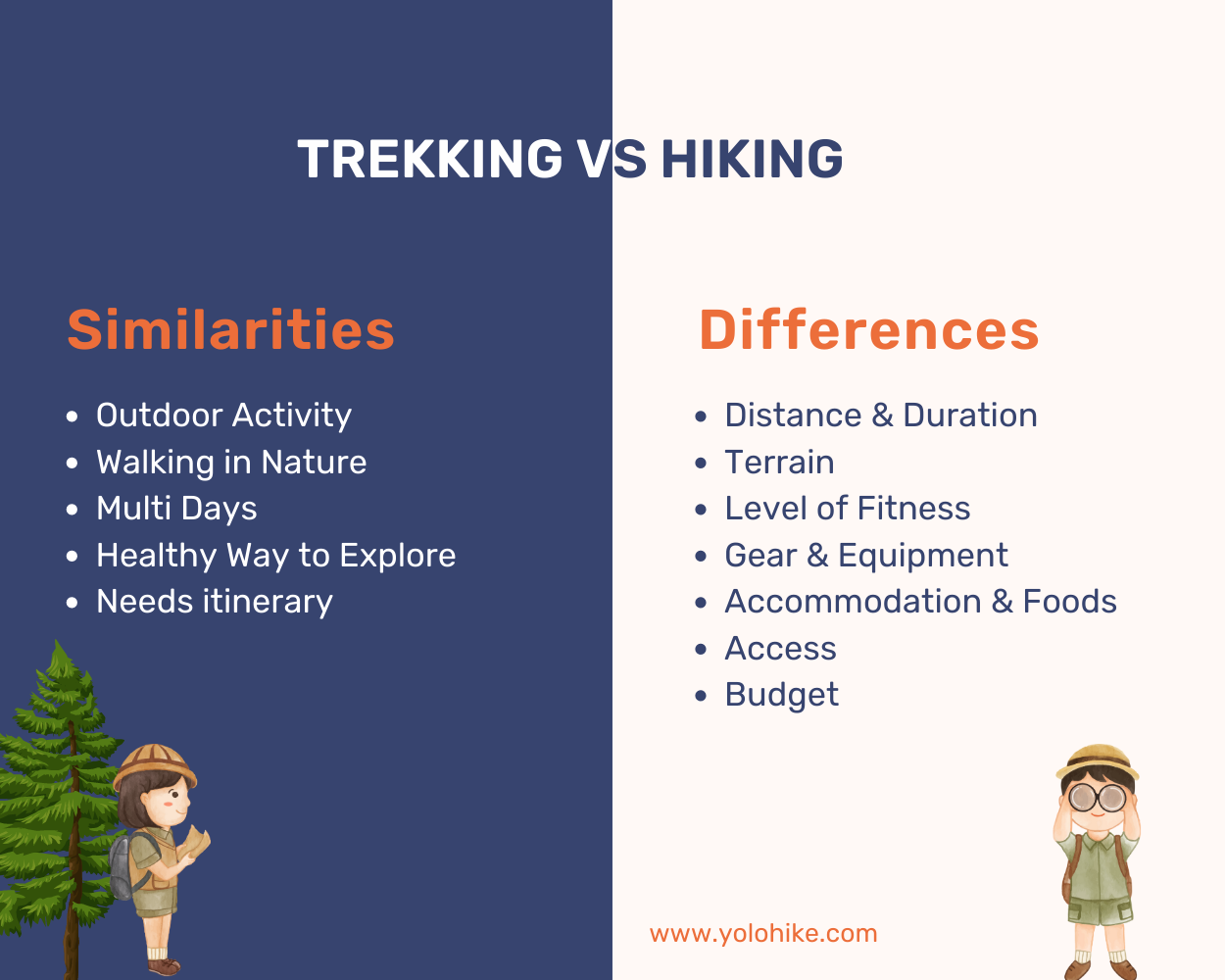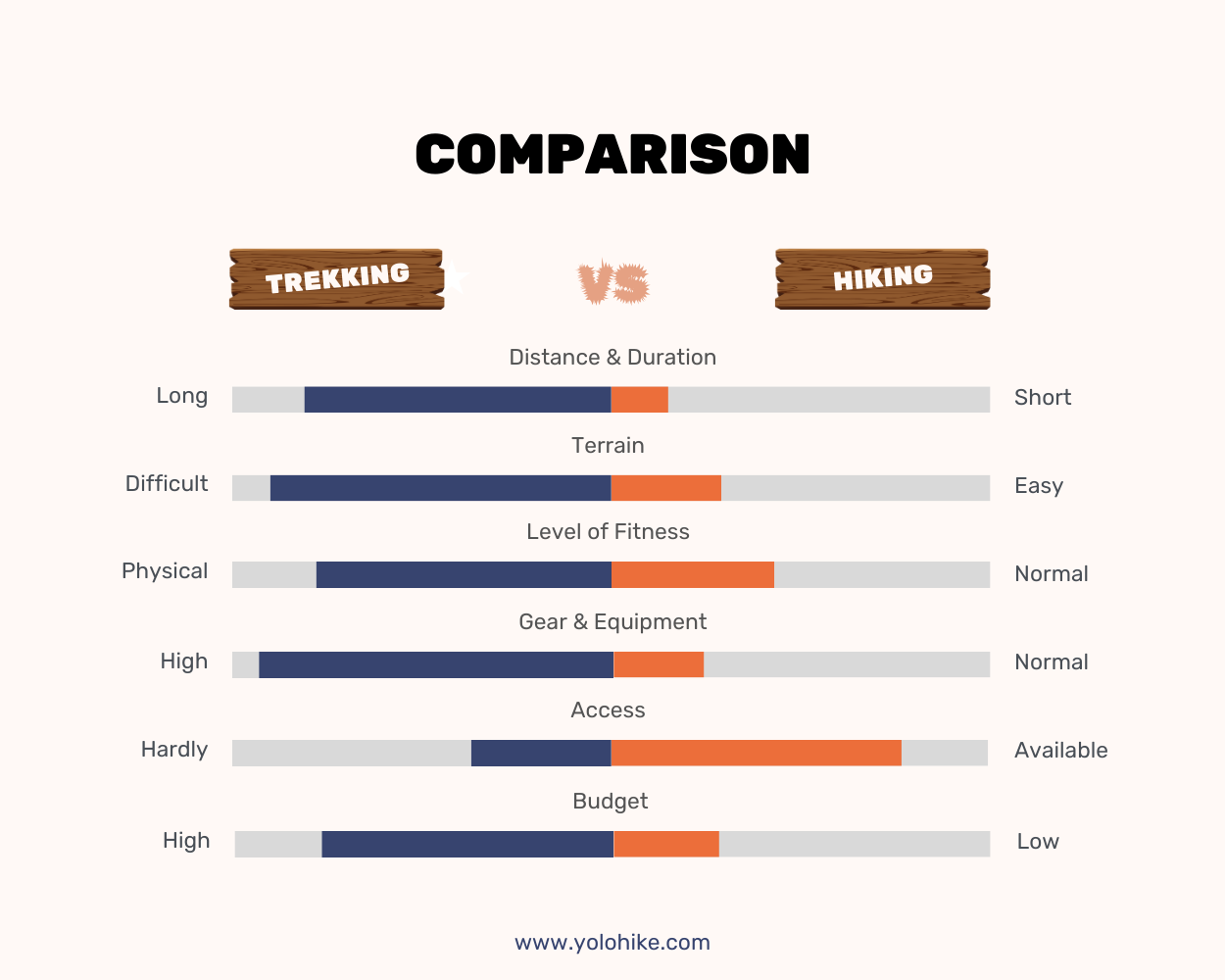As many people love to travel on vacation and holidays, travelers who seek to explore nature turn to Trekking and Hiking to discover new places and embrace natural environments.
If you are an outdoor enthusiast, you may have come across these two terms. These activities are similar in many ways that make most of us use them as a synonym, but they also have significant differences that set them apart and make your practice incorrect.
Trekking and Hiking both offer travel along the trail of mountains and hills, but they can be distinguished by time, difficulty, cost, and other several factors. Principally, Trekking takes longer days and requires multi resources, whereas Hiking is done in a day or some on an organized trail.
To ensure travelers emphasize the right approach for their travel needs, they should understand key differences between Trekking and Hiking, such as the days they target, the physical ability they ensure, and their budget. So, let's understand better and take relief from this confusion.

Trekking: A Challenging Adventure
Trekking is a challenging activity that involves hiking in remote, rugged areas for an extended period. It is usually undertaken over several days or weeks and requires a high level of endurance and fitness. Treks can involve steep ascents, descents, and rough terrain, making them a test of physical and mental endurance.
Annapurna Circuit and Everest Base Camp in Nepal is a great example of Trekking as they last for 12 to 16 days, cover a distance of 130 and 160 to 230 km respectively, and are physically challenging and require proper packing and equipment.
One of the key differences between trekking and hiking is the duration of the activity. Trekking involves multi-day hikes that require you to carry all the necessary gear and equipment, including food, shelter, and clothing. As such, it is an adventure that requires a high level of planning and preparation.
Hiking: A Walk in the Park
Hiking is a leisurely activity involving walking on established trails and paths. It can be done in a single day, and the terrain is usually well-maintained and not too challenging. Hiking can be done with minimal equipment, and it is a great way to enjoy nature and get some exercise.
Inca Trail Machu Picchu in Peru is a good example of the hike as it is 45 km distance which is achievable in 3 days and has an organized trail, Samaria Gorge in Greece is also the best example as it is just 16 km distance and can be achieved in a day.
Compared to trekking, hiking is less physically demanding, but it still provides many benefits. It can improve your cardiovascular health, strengthen your muscles, and reduce stress levels. Hiking is also an excellent way to connect with nature and enjoy the great outdoors.
Hiking is the "activity of taking long walks, particularly through the countryside."
Trekking: "to embark on a protracted, difficult journey, usually on foot."
How the terms are used
The words "Trekking" and "Hiking" are seen in quite different ways. Many individuals, travel articles, travel products, and Travel operators use these terms. We will see an example of how they are used.
Let’s assume, you live in the United States and want to explore the Three Passes of Everest in Nepal, which can be referred to as a trek. Whereas, you go to explore Yosemite National Park in San Francisco which is in the home nation and can be referred to as Hike.
Hiking is used when people travel a long distance for pleasure or exercise in natural surroundings and scenic locations this can be a multi-day or a day but not that strenuous and should not have many challenges.
Treks, on the other hand, are used as multi-day excursions. They require at least a few days of hiking, but frequently they require many days, weeks, or even months of hiking. These occur in rural and rigid areas and are far more difficult if compared to Hiking.
Countries like the United States and European nations do not have rigid locations they are more likely to use the term Hiking, However, the counties like Nepal and India have lots of Himalayas and have rigid locations to approach mountain sceneries they use the term Trekking more often.
However, both walks and treks can encompass a variety of terrain, and the main goal of both is to get you outside in an area of outstanding natural beauty.

The Key Differences
The main differences between trekking and hiking can be summarized as follows and are discussed based on the title so, it will be easy for you to understand.
Duration and distance
Trekking involves long-duration and multi-day hikes which can also be weeks and months of walking over changing landscapes and covering a long distance of more than 100 Km, some might be 500 km depending upon the location you choose, while hiking can be done in a few days and also in a single day or few hours and covers a minimum distance highly expanding to 50 Km.
Terrain
Trekking involves hiking in remote, rugged areas with steep ascents, descents, and rough terrain, one has to face difficulties of weather, natural adversity, altitude, and injuries sometimes and it is an adventure terrain while hiking is done on established trails and paths.
Level of fitness
Trekking requires a high level of endurance and fitness, you have to be in good physic, well prepared, and trained to perform trekking, while hiking can be done by people of all fitness levels to enjoy nature, hiking is also done while you prepare for trekking.
Gear and equipment
Trekking requires you to carry all the necessary gear and equipment which might be a headlight, Trekking Poles, crampons, good quality trekking boots, and proper clothing that supports every weather possibility, and the list goes on while hiking can be done with minimal equipment.
Accommodation and food
While trekking, accommodation, and food are crucial aspects, you have to choose good accommodations and meals to support your health and appetite. Many trails do not have any Tea House and Lodges so, you have to carry camping equipment and food, gas, etc. However, hiking is done within a day and multiday hikes offer a good settlement, and carrying food and camp won't be much of a trouble.
Access
Trekking routes are difficult to access depending upon weather, the time of the year, and natural disasters and require good research before embarking upon them. While Hiking can be done throughout the year and the trail is always accessible if any natural barriers won’t come on your way.
Budget
Lastly, the Budget arguably differentiates trekking and Hiking as Trekking is a long distance you have to invest in many effects and spend high according to days no matter whether you choose the package or travel independently. Hiking being short and organized you can spend in budget.

Which One is Right for You?
The choice between trekking and hiking depends on your personal preferences and fitness level. If you are looking for a challenging adventure that requires endurance and fitness, trekking is the way to go. It is an excellent way to push your limits and explore remote, rugged areas.
On the other hand, if you are looking for a leisurely activity that allows you to connect with nature and get some exercise, hiking is the perfect choice. It can be done in a single day, and the terrain is usually well-maintained and not too challenging. If you are willing to go on a trek, we suggest you go for a Hike as it will help you prepare better.
Conclusion
To sum up, trekking and hiking are two outdoor activities that offer many benefits. While they share some similarities, such as being great ways to exercise and connect with nature, they also have significant differences like distance, duration, Terrain, Level of Fitness, packing, etc. The choice between the two depends on your personal preferences and fitness level.
Feel free to contact us for any information regarding the holiday activities in Nepal, Tibet, and Bhutan. Just leave us a message and we will respond to you with proper information and guidance.


